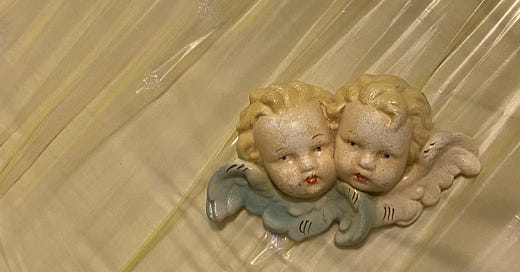Denis Johnson’s Heat-Sensation: Interrogating the Erotic in August
A Critical Literary Response to "Heat" by Denis Johnson
You fooled me, Denis. Congrats. Had I been born without the sixteen-line radar built-in to my mind, I wouldn’t know what you’ve done. I wouldn’t have questioned your facade of free verse. I wouldn’t have resigned to my thinking pose and exerted a hm. Thinking: Is this a sonnet?
“Heat” upholds a consistent rhyme scheme, wrapped in a rhythmic bassinet of pentameter, cradling us into a volta, an instant pirouette from the narrow subject, “beautiful Susan,” into the broader scope of the month of August. So, how did he do this? He wrapped this poem in a metaphorical sheer and distressful dressing gown, upending its own formal convention in form by subverting, even vandalizing, its classical roots. Once he brings readers in with the seductive image of the “naked lover” and builds the erotic, microcosmic interspace of the muse, we learn that Johnson only constructs tension to dismantle it. First, we discover that “beautiful Susan” is, in fact, “streaming with hatred.” Then, at the volta, he abandons the descriptive voice by declaring fury against the incoherencies of human intimacy and desire.
In this essay, I will be holding a looking glass over Johnson’s use of imagery as a tool to construct a scene, that vibrant, hot-and-heavy oasis of his ‘electric dusk.’ He opens this piece by illustrating the scene bluntly, establishing place through the metaphor of physicality and energy:
“Here in the electric dusk your naked lover
Tips the glass high and the ice cubes fall against
her teeth.”
As he describes “your naked lover” tipping her glass high, he illustrates a sense of elegance and softness to her character, divorcing us from the hardened and straightforward description of her naked state. Entering lyrical space in “the ice cubes fall against her teeth” brings us up close, narrowing the narrative lens into a microscopic, detailed romantic perspective.
“It’s beautiful Susan, her hair sticky with gin,”
In this line, Johnson clarifies that he is not writing to the subject, ‘beautiful Susan,’ but her lover, further pushing us into erotic space, detailing her hair's stickiness. Rhyming it with an arch, the following line calls back with an evocative epithet:
“Our Lady of Wet Glass-Rings on the Album Cover,
streaming with hatred in the heat.”
From this line, he elucidates his vision, clarifying that ‘your lover’ lives in an album cover and is, for some unknown reason (which, in this, we may or may not arrive at a conclusion at the end), “streaming with hatred in the heat.” A heat, which may nod to sexual innuendo of a steamy intimate sphere or may just be upset because of the discomfort we feel when we’re confronted with an intrusive heat.
“as the record falls and the snake-band chords begin
to break like terrible news from the Rolling Stones,
and such a last light — full of spheres and zones.”
Here, Johnson deviates from tending to the reader’s conception of the muse by directing our attention to the scene's outer sphere. I wouldn’t argue that these lines advocate for the sonic and audial experience as much as the portrayal of ambiance. He exerts a comical jab by describing Rolling Stone’s music as “terrible news,” while also extending metaphor in the circulation within a contained space. By penning: “full of spheres and zones,” he bloats the static image through contrast, expanding its breadth through the description of fullness, delivering his reader to the volta:
“August,
you’re just an erotic hallucination
just so much feverishly produced kazoo music,
are you serious?”
Johnson redirects his reader’s attention by addressing August (as in the month) directly, calling its fevered stead an ‘erotic hallucination.’ Or perhaps he does this by causing his reader to trip on the rhetorical question he poses, accumulating such tension that it causes an explosive effect. Not only is it surprising in the ways of his casual tone (especially since this is a sonnet, after all) but also in the way a traditional sonnet’s artifice is most often centered around an idea that readers rarely question too narrowly.
“this large oven impersonating night,
this exhaustion mutilated to resemble passion,
the bogus moon of tenderness and magic
you hold out to each prisoner like a cup of light?”
As I look back on this poem and ask myself what it is precisely that he is writing about, my mind circulates about heat interpretations in its various forms. In the passionate, he dwells on beautiful Susan's still image, summoning her onlooker through the romanticized images detailing our understanding of her appeal. Next, he discusses the discomfort of physical heat in August, denouncing it by claiming it as an “erotic hallucination.” While the mind deviates from the subject, we discover how Johnson’s narrative magic in his longer works bleeds into his work in this sonnet. Realizing the various realms we enter and exit through the piece, embodying the multiplicities of heat, passion confused and confined within it, and the static oasis rising from the print.



